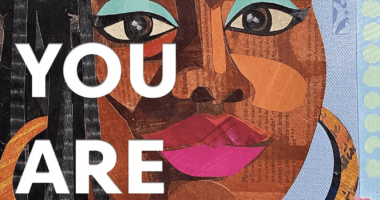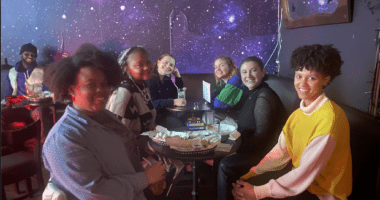Field Notes covers stories from NYC learning spaces as told by CWP’s Teaching Artists.
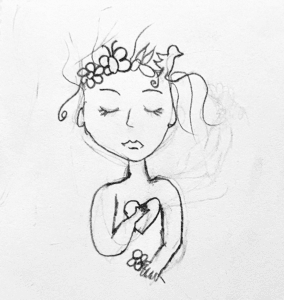
In November 2023, I started a residency at Long Island City High School, a 2,500-student community school in Queens.
My co-Teaching Artist, Jenny Luna, and I were working in the school’s ELL (English Language Learners) program, teaching poetry and music to 9th and 10th graders. Many of our students had recently immigrated from Central and South America, and predominantly spoke Spanish.
Just a month before the start of our residency, New York City announced a new policy which limited the amount of time that immigrant families could live in the city’s shelter system. Families in shelters were given 60 days to find alternate housing, which, for children and teens, often meant moving to a new school in a new neighborhood midway through the year.
Throughout our residency, students came and went. Some of them were impacted by the 60-day policy, which meant regular fluctuations in the class rosters. Others were juggling commitments that sometimes took precedence over coming to class—they had siblings to care for or children of their own, or they were working part-time jobs in addition to school. Many students had not had formal schooling in several years, and some were quite a bit behind grade level. Others had come from very high quality schooling in their home countries–one of our students had even been an award-winning youth poet in Colombia.
Jenny and I did our best to create lessons that were accessible and interesting to all students, and welcoming to students who joined the class midway through the residency, or could only make it to class some of the time. We hoped that, each Monday and Friday, we could create a supportive environment for students to explore and play with language and music. We wanted our class to be as much a space for students to reflect and share vulnerably as it was for them to invent, imagine, and escape.
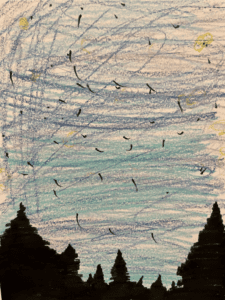
The theme that we landed on for the residency was exploring how poetry and music can help us reflect on the past, observe the present, and imagine the future. We hoped that this theme would be grounding for students who were experiencing periods of transition and upheaval. For many of our students, life in their home countries had been upended rapidly and unexpectedly when it came time to move to the U.S. The people and places that they had called home were now situated in a past that they would not be able to return to. Their experience of the present was one of constant readjusting and relearning, and their ideas of the future would have to be renegotiated.
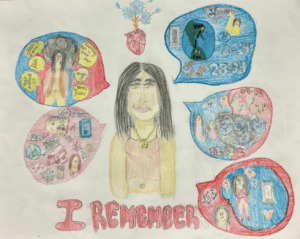
To reflect on the past, we used “I remember” poetry, a form inspired by Joe Brainard that encourages free association and stream of consciousness around the theme of memory.
The students wrote:
“I remember when I smelled the ocean and hearing the waves
I remember when I hugged my Mexico cousin for the last time”
“Me acuerdo cuando jugaba fútbol con mis amigos de primaria con una pelota rota pero nosotros éramos felices.” [I remember when I used to play soccer with my friends from primary school with a broken ball but we were happy.]
“Me acuerdo de tus ojos llorones,
me acuerdo de tu risa juguetona,
me acuerdo de tus manos arrugadas”
[I remember your teary eyes
I remember your playful laugh
I remember your wrinkled hands]
“I remember when I saw him the last time… Six years ago of that and yo sigo extrañándote como aquel día en el que entendí que no te volvería a ver.”
[… Six years ago and I still miss you as I did that day when I realized I would never see you again.]
On the second day of the “I remember” assignment, a student with a blank page in front of him asked me: “¿Y si no me gustan mis recuerdos?” [What if I don’t like my memories?]. I told him he had a few options. He could explore memories that felt painful, and see how it felt to do so. Or, he could find the moments that did bring joy and focus on those. I also told him that poetry doesn’t have to tell the truth. If he wanted to, he could invent a different person with different memories. For the time being, his page remained blank. When it came time for the students to compose music that accompanied their poems, however, he did so enthusiastically, creating two equally complex music tracks.
We moved on to exploring the present by thinking about place—specifically New York City. Using Nate Marshall’s poem “when i say Chicago,” we asked students to write poetry about their experiences in New York—this strange, difficult, and incredible city where our students were learning to make a life.
To the prompt, ‘when i say New York,’ they wrote:
“Cuando digo Nueva York me refiero a la tranquilidad y sanidad propia, al esplendor de las calles, al aire que huele al arcoiris.”
[When I say New York I mean tranquility and sanity, the splendor of the streets, the air that smells like the rainbow.]
“Sus rascacielos desafían al cielo,
mientras sus calles cuentan mil historias de anhelo.”
[Its skyscrapers defy the sky,
while its streets tell a thousand stories of longing.]
“When I say New York I mean going to the hospital for a check up and having a bill of $2,000 or more.”
“Cuando digo Nueva York, me refiero a un New York justo y brillante que abre sus puertas a nosotros los migrantes.”
[When I say New York, I mean a just and brilliant New York that opens its doors to us the immigrants.]
“Cuando digo New York
me refiero al miedo que
a veces tengo.”
[When I say New York,
I mean the fear
I sometimes have.]
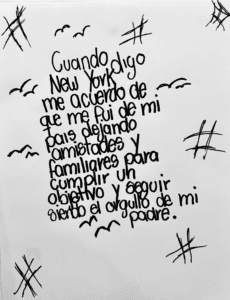
To finish the residency, we had students co-create community poems (see example below), imagining their lives and communities in thirty years. They imagined themselves traveling, living in their own apartments, working as doctors or chefs, owning cats, and driving flying cars.
The end of the residency was also a time for students who had not yet finished their own “I Remember” or “When I Say New York” poems to write something that could be published in our anthology. I made fill-in-the-blank worksheets for these students, but when I handed one to the student who had told me that he didn’t like his memories, he handed it back to me, saying he knew what he wanted to write. He wrote a thoughtful and moving poem about the passing of his father, and asked if he could read it to me privately. He told me that writing the poem didn’t make him less sad, but that “it helped in some way.”
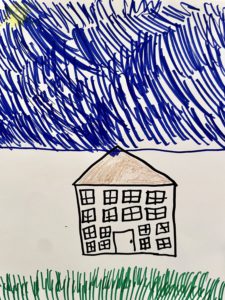
On our last day, we asked students to share one word expressing how they felt about their time in the residency. While many students simply said something along the lines of “good,” others said words like “serenidad” [serenity] or “libertad” [freedom]. One student who had only made it to a handful of classes said, “me siento como una mejor persona” [I feel like a better person].
In May 2024, Jenny and I will return to LICHS to share the printed anthologies of student work: Your Past, My Present, Our Future / Tu Pasado, Mi Presente, Nuestro Futuro. I don’t know which students will still be in the classroom by the time we make it back. I hope, though, that they will feel as proud of themselves as I do of them.
A poem from 10th graders at LICHS, who each contributed one or more lines to create a Community Poem about the future:
Tal vez en el futuro de tu familia, destellan sueños compartidos.
En la danza del tiempo, cada miembro es un verso, tejido en risas y abrazos.
Juntos enfrentan mañanas inciertas, forjando memorias que serán su fortuna.
Perdurable en el libro inacabado de la vida.
30 años desde hoy yo tendré un trabajo de psicología y podré ayudar a muchas personas a superar sus problemas y tristezas.
30 años desde hoy yo habré dominado bien el inglés y podré comunicarme perfectamente con las personas que solo hablan inglés.
30 años desde hoy viajaré a mi país. Volveré a encontrarme con mi abuela y amigos de la infancia.
En treinta años tendré una casa con su jardín y con su piscina.
En 30 años ya habré cumplido todas mis metas y estaré de vuelta con mi familia.
30 años desde hoy, sueño con un mundo sin odio, un mundo donde nadie sea juzgado por ser quien es.
Espero que en 31 años se haya cumplido todo lo que quise que se cumpliera en 30 años.
[Perhaps in your family’s future, shared dreams sparkle.
In the dance of time, each member is a verse, woven in laughter and embraces.
Together you face uncertain mornings, forging memories that will be your fortune.
Enduring in the unfinished book of life.
30 years from today I will have a job in psychology and will be able to help many people overcome their problems and sadness.
30 years from today I will have mastered English well and will be able to communicate perfectly with people who only speak English.
30 years from today I will travel to my country. I will meet my grandmother and childhood friends again.
In thirty years I will have a house with a garden and a swimming pool.
In 30 years I will have accomplished all my goals and be back with my family.
30 years from today, I dream of a world without hate, a world where no one is judged for who they are.
I hope that in 31 years everything I wanted to be fulfilled in 30 years will have been fulfilled.]
In late January 2024, just after our residency ended, I led a community poem workshop for the Latinx affinity group at Linklaters, a law firm that partners with Community-Word Project, supporting its arts residencies.
I shared stories and poetry lines from our students at Long Island City High School, and discussed the realities that new arrival immigrant youth are facing in New York City. Finally, we created a community poem together, using a similar structure to the one we used at Long Island City High School. The staff at the Linklaters event shared that it was meaningful to experience first hand the process that our students had participated in while writing their poetry.


